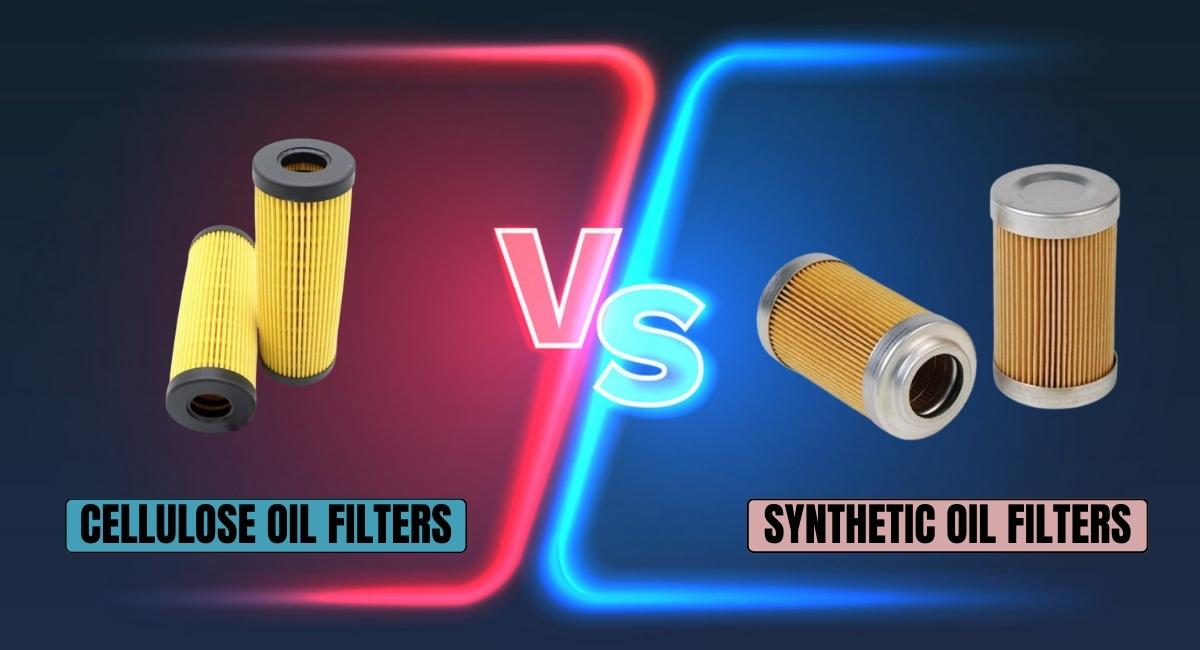Understanding your vehicle’s health requires delving into its components’ intricacies. The lifeline of your vehicle’s engine is the oil and the oil filter that ensures the motor oil is free from harmful debris and contaminants. But with cellulose and synthetic, it becomes crucial to understand which one might be the best fit for your vehicle.
Cellulose filters are a naturally occurring polymer that excels as a filtration material because of its impressive durability and variability in fiber size. On the other hand, most people prefer synthetic oil filters for capturing minute impurities over extended distances.
This comprehensive comparison guide delves into the nuances of cellulose vs. synthetic oil filters, allowing you to make an informed decision.
But first,
What is an Oil Filter Media?
Oil filter media is the material inside an oil filter that filters contaminants out of the oil. This media is made of paper, cellulose fibers, synthetic fibers, or a blend of cellulose and synthetic fibers.
The oil filter media is typically pleated or folded to increase its surface area, which helps to maximize the filter’s capacity to trap and hold contaminants. The oil circulates through the engine and passes through the filter media. And the media captures and holds onto the particles of dirt, metal, and other contaminants, preventing them from circulating back into the engine, where they could cause wear and damage.
The performance of an oil filter, including its efficiency, capacity, and flow rate, is largely determined by the characteristics of the filter media, such as its material composition, fiber size and density, and the overall design and construction of the filter. As such, the choice of filter media is a critical factor in determining the quality and suitability of an oil filter for a particular application.

Cellulose vs. Synthetic Oil Filter: An Overview
An oil filter is an integral component of a vehicle’s engine system. The filters come in various types, but the main materials used in their construction boil down to cellulose and synthetic.
Cellulose Oil Filter
Cellulose filter media is one of the most traditional oil filters used in the automotive industry. The primary material of cellulose oil filters is plant fibers or pulp, similar to paper.
The fibers in cellulose filter media are irregular and have a range of sizes, creating a more random, intricate web for oil to pass through. This structure allows cellulose media to trap and retain various particle sizes effectively. Typically, cellulose filters can capture about 97-98.5% of particles that are 15-40 microns in size.
One of the key advantages of cellulose filter media is its cost-effectiveness. Given its plant-based origin, cellulose is relatively inexpensive to produce, resulting in lower-priced oil filters. It makes cellulose filters a popular choice for budget-conscious consumers and those who change their oil frequently.
However, cellulose media tends to have a shorter lifespan than synthetic media, often requiring replacement at every oil change. It is due to the natural fibers breaking down more quickly under the high-temperature conditions inside an engine.
Another notable feature of cellulose filter media is its environmental impact. Cellulose is biodegradable and more environmentally friendly when it comes to disposal than synthetic media since it is a plant-based material.
Cellulose filter media balances cost and performance, making it suitable for everyday driving conditions. However, a synthetic or blended media may be more appropriate for high-performance or heavy-duty applications.
Synthetic Oil Filters
Synthetic oil filters represent a more recent innovation in oil filter technology, designed to address some of the limitations of traditional cellulose filters. These filters use man-made materials, such as nylon, polyester, or glass fiber, to construct the filter media.
Synthetic media boasts a uniform fiber size and shape than cellulose. This uniformity allows synthetic filters to trap more of the smaller particles that pass through a cellulose filter. Filters made of synthetic fibers can capture 99% of particles, even those that are small. This superior filtration efficiency can better protect your engine against wear and tear.
Another advantage of synthetic oil filters is their durability. Synthetic materials are more resistant to heat and pressure, allowing synthetic filters to maintain their performance under harsh operating conditions and over extended periods. Because of this, synthetic oil filters typically last longer than cellulose filters, often matching the longer oil change intervals of modern synthetic engine oils.
However, these advantages come at a cost. Synthetic oil filters are typically more expensive than cellulose filters due to the higher cost of the synthetic materials and the more advanced manufacturing processes involved.
From an environmental perspective, synthetic filters are not biodegradable like cellulose filters. However, their longer lifespan can mean fewer filter changes and less overall waste.
Synthetic oil filters offer superior performance and durability compared to cellulose filters, making them an excellent choice for high-performance or heavy-duty applications or vehicles operated in harsh conditions. However, they come with a higher price tag, which is a factor to consider.
Synthetic vs. Cellulose Oil Filter Media Comparison
When delving deeper into the intricacies of synthetic vs. cellulose oil filters, you must examine several key aspects to make a well-informed comparison.
Material Analysis
Cellulose filters, made primarily from plant fibers, have been a long-standing choice in the automotive industry. They can trap 97-98.5% of particles that are 15-40 microns in size, thereby offering a significant level of protection for most engines.
On the other hand, synthetic oil filters are composed of artificial materials such as nylon, polyester, or glass fiber. Their more consistent fiber size and shape allow them to catch about 99% of particles, even those as small as 20 microns.
Performance
Regarding filtration efficiency, synthetic filters take the lead due to their superior ability to trap smaller particles. This higher efficiency means synthetic filters protect your engine against wear and tear.
The lifespan of an oil filter is another critical factor. Synthetic oil filters typically last longer than cellulose filters due to their superior heat and pressure resistance. The design can handle more prolonged use, often matching modern synthetic engine oils’ longer oil change intervals.
Environmental Impact
From an environmental perspective, cellulose filters, being biodegradable, have an edge. They break down more quickly in the environment, leading to less landfill waste.
Synthetic filters, while not biodegradable, offer their form of environmental benefit. Due to their longer lifespan, they require less frequent changes, reducing the overall amount of waste generated over time.
Cost Comparison
The cost is another area where synthetic and cellulose oil filters differ significantly. Synthetic oil filters are usually more expensive upfront due to the higher cost of synthetic materials and the advanced manufacturing processes involved.
However, when considering the long-term costs, the picture might change. Given their longer lifespan and potentially better engine protection, synthetic filters could prove more cost-effective, especially for those who use synthetic engine oil or drive in harsh conditions.
Also Read: Why Does My AC Turn Off When I Accelerate?
While synthetic oil filters generally offer superior performance and longevity, cellulose filters are still a valid choice for many drivers, particularly those seeking a more eco-friendly and budget-friendly option. The best choice depends on your driving conditions, maintenance habits, and personal preferences.
Conclusion
Whether cellulose or synthetic, each type of oil filter offers unique advantages. While cellulose filters offer a cost-effective solution for normal driving conditions, synthetic filters provide superior performance and durability, making them ideal for high-performance vehicles or demanding driving conditions. Therefore, when deciding between cellulose and synthetic oil filters, let your vehicle’s specific needs, driving habits, and budget guide your choice. After all, the importance of an oil filter in maintaining your engine’s health is paramount – so make your choice wisely!
